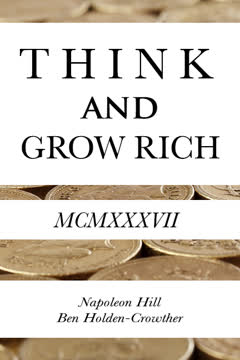Key Takeaways
1. Your Mind Shapes Your Entire Reality
The mind is a place of its own, and in itself can make heaven out of hell and hell out of heaven.
Mind's power. The state of your mind is the single most important factor determining the quality of your life, creating your perceptions of happiness and distress. A trained mind is a resource for optimism and joy, while an untrained mind leads to misery. This internal state is more powerful than external circumstances.
Inner vs. outer. We often focus on changing external factors or battling circumstances, believing happiness lies outside ourselves. However, the subtle inner world of our desires, attachments, and aversions, shaped by our mind, is far more compelling and dictates our experience. Improving your mind is prioritizing an infallible friend within.
Thoughts' impact. Thoughts are subtle energy waves generated by the mind that profoundly impact us. They influence our physical appearance, health (as seen in the placebo/nocebo effect), and most importantly, they are the roots of our actions. Cultivating noble thoughts naturally draws favorable circumstances into your life, forging your destiny thought by thought.
2. Desire is the Root of All Mental Suffering
Desire is universally singled out in all the Vedic scriptures as the worst mental affliction.
Afflictions' origin. Mental illnesses like anger, greed, envy, and pride afflict us, often unrecognized as diseases but dismissed as "human nature." These are far more debilitating than physical ailments. The Vedas identify desire (kāmanā) as the most perilous affliction, the mother from which anger and greed arise.
Desire's offspring. When the fulfillment of a desire is obstructed, anger arises. When a desire is fulfilled, it doesn't disappear but returns with greater intensity, leading to greed. Desire can never be satiated by fulfillment; it's like trying to extinguish fire with clarified butter – it flares up with redoubled vigor.
Chasing a mirage. Worldly pleasures are compared to a mirage (mṛiga tṛiṣhṇā) that the deer chases endlessly, only to die of exhaustion. Similarly, we chase illusory happiness through sense gratification, but it always recedes. Renouncing sensual desires and turning the mind inward connects us with the soul's inner bliss, making us godlike in virtue and contentment.
3. Attachment, Fueled by Contemplation, Creates Desire
It is our attachment to an object, not its intrinsic properties, which create desire for it.
Attachment's role. Desire doesn't arise from an object's intrinsic qualities but from our attachment to it. The mind frequently visits things and people it's devoted to. An alcoholic craves foul-smelling alcohol not because of its smell, but because of attachment developed through repeated association with perceived pleasure.
Repetitive thinking. Attachment develops when the mind repeatedly contemplates happiness in a specific object or person. This repeated contemplation (dhyāyato) etches a connection. The Bhagavad Gita explains this chain: contemplation of sense objects leads to attachment (saṅga), attachment creates desire (kāma), and desire leads to anger (krodha).
Redirecting contemplation. Since seeking happiness is the soul's inherent nature (God is bliss, and we are His parts), we cannot stop contemplating bliss. The solution is simple: replace lower attachments with higher ones. Contemplate happiness in beneficial things like knowledge, health, or service. Most powerfully, repeatedly contemplate happiness in God to develop attachment and dovetail desires towards Him, purifying the mind.
4. Habits, Forged by Repetition, Determine Your Character and Destiny
First, we mould our habits, and later, our habits mould us.
Habits' power. Most of our thoughts and behaviors are automatic, driven by habitual conditioning rather than conscious analysis. Habits become an intrinsic part of our personality, shaping who we are. Like a cable woven thread by thread, individual actions solidify into powerful, almost unbreakable habits.
Neuroplasticity. The brain's neuroplasticity allows it to form new neural connections. When thought patterns or actions are repeated, their neural circuits become etched in the basal ganglia, making the behavior easier and more automatic. This is the brain's way of simplifying work, but it programs us for both good and bad habits.
Changing habits. While bad habits form easily (often from immediate pleasure), good habits require effort. Changing them is difficult, like a rocket breaking gravity's pull – the "lift-off" requires tremendous willpower. To change, deeply convince yourself of the long-term benefits of good habits (śhreya) and the pain of bad ones (preya). Consistent practice, even small victories, builds the willpower muscle and replaces old habits with new ones.
5. Empower Your Intellect to Discern and Control the Mind
To cross over the material ocean and attain your divine goal, illumine your intellect with divine knowledge, then with the illumined intellect, control the unruly mind.
Mind vs. Intellect. Our internal machinery (antah karan) has four aspects: mind (thoughts, desires), intellect (analysis, decision, discernment), subconscious (memory, impressions), and ego (identity). The intellect decides, and the mind desires accordingly, but often the mind rebels, leading to internal strife.
Intellect's power. The intellect possesses the power of discernment (vivek), enabling it to control the mind and senses. Even ordinary people use their intellect to override the mind's desires (e.g., going to work despite disliking it, controlling anger where it's dangerous). This capacity is primarily human; abandoning it reduces us to the level of animals.
Buddhi Yog. The Bhagavad Gita calls the science of mind management Buddhi Yog (Yoga of the Intellect). It emphasizes empowering the intellect with right knowledge to govern the mind. The soul, the passenger in the body-chariot, must direct the intellect-charioteer to control the mind-reins and sense-horses, rather than being passively carried away.
6. True, Infallible Knowledge Comes from Divine Sources
Access to the Vedas is the greatest privilege this century may claim over previous centuries.
Knowledge types. There are two ways to acquire knowledge: the ascending process (using senses, mind, intellect to discover) and the descending process (receiving from a perfect source). The ascending process is inherently flawed due to our limited, imperfect faculties, leading to theories that are constantly superseded.
Descending process. The descending process, receiving knowledge from an infallible source, is both easy and faultless. In spiritual matters, the Vedas are considered the ultimate, eternal, God-revealed authority (apauruṣheya). This knowledge is best understood through a guru, an enlightened saint who has practically realized its wisdom.
Three steps. Empowering the intellect with divine wisdom involves a three-fold process:
- Śhravaṇ: Hearing or reading divine knowledge repeatedly until it's internalized.
- Manan: Contemplating deeply and repeatedly on the knowledge to retain it and transform it into conviction.
- Nididhyāsan: Developing firm beliefs based on this knowledge, making it one's moral compass and unleashing self-transformation.
7. Conquering the Mind Requires God's Grace Through Surrender
mām eva ye prapadyante māyām etā ṁ taranti te (7.14)
Maya's power. The mind is made of maya, God's energy, which is as powerful as God Himself and unconquerable by self-effort alone. Maya bewilders souls turned away from God and torments them until they surrender to Him. Even great yogis struggle to escape its afflictions.
Grace is essential. To overcome maya and conquer the mind, the finite soul needs the support of God's infinite grace. This grace is not whimsical but follows rational laws; God bestows it when we become qualified by surrendering to Him (śharaṇāgati).
Six aspects of surrender. Surrender is an internal state of consciousness, not just external acts. The scriptures outline six aspects:
- Desire only God's will.
- Do not desire against God's will.
- Have firm faith in God's protection.
- Maintain an attitude of gratitude towards God.
- See all possessions as belonging to God.
- Relinquish the pride of having surrendered.
8. Practice Karm Yog: Keep Your Mind in God While Working in the World
mana hari me ṅ tana jagata me ṅ , karm yog yehi jāna
Stress's cause. Stress arises from attachment to specific outcomes and worry that things won't turn out as desired. The outcome of our efforts depends on many factors beyond our control. Stress management techniques often address symptoms, not the root cause.
Work without attachment. The remedy is to give up attachment to results and focus on putting in your best effort (karmaṇy-evādhikāras te mā phaleṣhu kadāchana). This detachment doesn't decrease performance; it increases effectiveness by freeing the mind from anxiety. Modern research also supports focusing on the process, not just the outcome.
Karm Yog. Karm yog is the art of working in divine consciousness: 'Body in the world and mind in God.' It means performing worldly duties while the mind is attached to God. This constant remembrance (sarveṣhu kāleṣhu mām anusmara) allows us to work for God's pleasure, accept results serenely, view others divinely, and progress towards God-realization amidst daily life.
9. Your Subconscious Carries Impressions from Endless Past Lives
However, Sigmund Freud would have been astonished to hear that our subconscious mind is not of just one lifetime; it continues with the soul since innumerable past lifetimes!
Rebirth. The soul transmigrates from body to body (dehāntara-prāpti), shedding worn-out physical bodies like old clothes. At death, the subtle body (mind, intellect, ego) and causal body (karmas, tendencies) continue with the soul into the next life.
Subconscious depth. Our subconscious mind is a vast memory bank carrying images, experiences, and tendencies (sanskārs) from endless past lifetimes. This explains innate attitudes, phobias, and talents that aren't traceable to the current life. Phenomena like déjà vu and babies' instinctive behaviors also point to past-life impressions.
Deep roots. Our fundamental nature and attitudes, like optimism or pessimism, have deep roots in these past-life impressions stored in the subconscious. The subconscious influences conscious thoughts and feelings but cannot reason logically. To control the mind, we must purify these deep-seated impressions.
10. Reshape Your Mind Using Positive Self-Talk and Visualization
A picture is worth a thousand words.
Mind's language. The mind thinks in images, which are more impactful and memorable than words. This is why visualization is a powerful technique for influencing the mind, especially the subconscious. Consciously creating beneficial images impacts our inner state.
Self-talk & affirmation. We constantly engage in silent self-talk, which unintentionally programs our subconscious. Negative self-talk leads to cynicism and misery. Deliberate, positive self-talk, or affirmation, can program the psyche positively (e.g., "I can do it," "God is with me"). Chanting God's names (japa) is a Vedic form of affirmation, sending devotional prompts to the subconscious.
Visualization & Roop Dhyan. Visualization is even more powerful. Process visualization (imagining steps) enhances skills, while outcome visualization (imagining success) motivates. For devotion, visualize God's form (Roop Dhyan) while chanting. This gives the mind a tangible focus. Enhance this by meditating on His divine qualities, pastimes (leelas), or serving Him in the mind (mānasī sevā).
11. Consistent Daily Spiritual Practice is Essential for Transformation
Good ideas are a dime a dozen, but they are not worth a single nickel if they are not put into practice.
Practice is key. Theoretical knowledge of mind management techniques is useless without practical application. Mastery requires consistent, disciplined practice (sadhana), just like any skill. This training is ideally done under the guidance of a guru, a spiritual mentor who has realized the truth.
Sadhana in seclusion. Daily sadhana in solitude is crucial because the world's distractions constantly pull the mind towards worldliness. Seclusion allows focused practice of meditation, contemplation, and reflection to purify the mind and build divine consciousness, which can then be sustained throughout the day using karm yog.
Daily commitment. Dedicate time daily for sadhana, ideally one-tenth of your time (approx. 2.4 hours), or at least one hour. The early morning hours (Brahma Muhūrt) are best as the mind is fresh. Consistency is vital; even if you miss a day, resume practice immediately. This dedicated effort is the engine of inner transformation.
Last updated:
FAQ
1. What is "The Science of Mind Management" by Swami Mukundananda about?
- Practical Guide to Mind Mastery: The book is a comprehensive guide to understanding, managing, and transforming the mind using ancient Vedic wisdom and practical techniques.
- Blend of Spirituality and Psychology: It integrates insights from Vedic scriptures, modern psychology, and real-life stories to explain how the mind works and how it can be harnessed for personal growth.
- Focus on Inner Transformation: The central theme is that true happiness, success, and fulfillment come from mastering the mind, not from external circumstances.
- Step-by-Step Techniques: The book offers actionable methods such as contemplation, affirmation, visualization, and meditation to help readers achieve mental clarity and inner peace.
2. Why should I read "The Science of Mind Management" by Swami Mukundananda?
- Universal Relevance: The book addresses common struggles like stress, negative emotions, and lack of fulfillment, making it relevant for anyone seeking self-improvement.
- Ancient Wisdom for Modern Life: It translates timeless Vedic teachings into practical advice for contemporary challenges, bridging spirituality and daily living.
- Actionable Tools: Readers gain access to proven techniques for habit formation, self-discipline, and emotional resilience.
- Holistic Approach: The book covers not just mental health, but also spiritual growth, physical well-being, and the pursuit of life’s higher purpose.
3. What are the key takeaways from "The Science of Mind Management" by Swami Mukundananda?
- Mind as Friend or Foe: The mind can be your greatest ally or worst enemy, depending on how you manage it.
- Thoughts Shape Destiny: Repeated thoughts form habits, habits shape character, and character determines destiny.
- Inner Change Precedes Outer Change: True transformation begins within; changing your mind leads to changes in your life circumstances.
- Practical Spirituality: Techniques like contemplation (chintan), affirmation, visualization, and surrender (sharanagati) are essential for mind management and spiritual progress.
4. How does Swami Mukundananda define the mind and its role in "The Science of Mind Management"?
- Subtle Internal Machine: The mind is described as a subtle machine that incessantly generates thoughts, feelings, desires, and aversions.
- Source of Bondage and Liberation: According to Vedic scriptures, the mind alone is responsible for both suffering (bondage) and freedom (liberation).
- Thoughts Impact Everything: The mind’s thoughts influence physical health, actions, happiness, and even external circumstances.
- Mind-Body Connection: Negative thoughts can manifest as physical ailments, while positive thoughts can promote healing and well-being.
5. What are the main afflictions of the mind discussed in "The Science of Mind Management" by Swami Mukundananda?
- Core Mental Diseases: The book identifies anger, greed, desire, envy, and pride as primary mental afflictions (manas rog).
- Root Cause is Desire: Desire is highlighted as the mother of anger and greed; unfulfilled desire leads to anger, while fulfilled desire leads to greed.
- Attachment Fuels Desire: Attachment to people or objects gives rise to desires, which then trigger the cycle of mental suffering.
- Solution is Higher Attachment: The way out is to replace lower attachments with higher ones, especially attachment to God or noble ideals.
6. How does "The Science of Mind Management" by Swami Mukundananda explain the power of habits?
- Habits Shape Personality: Habits are automatic patterns of thinking and behavior that become ingrained in our character.
- Neuroplasticity and Conditioning: Repeated thoughts and actions create neural pathways, making certain behaviors easier and more automatic over time.
- Good vs. Bad Habits: Good habits require effort to form but are easy to live with; bad habits form easily but are hard to break and live with.
- Breaking and Building Habits: The book emphasizes the importance of willpower, self-analysis, and repetition in breaking bad habits and establishing beneficial ones.
7. What is the role of the intellect in controlling the mind according to "The Science of Mind Management" by Swami Mukundananda?
- Intellect as Decision-Maker: The intellect (buddhi) analyzes, discriminates, and makes decisions about what is beneficial or harmful.
- Mind-Intellect Dynamic: The mind generates desires, while the intellect has the power to approve or restrain them.
- Vivek (Discernment): The ability to use the intellect to control the mind is called vivek, and it is essential for self-mastery.
- Empowering the Intellect: The intellect must be empowered with divine knowledge to effectively govern the mind and lead to right action.
8. What are the three steps to empower the intellect in "The Science of Mind Management" by Swami Mukundananda?
- Shravan (Hearing Divine Knowledge): Regularly listen to or read spiritual wisdom from authentic sources to open the mind to higher truths.
- Manan (Contemplation): Reflect deeply and repeatedly on the knowledge to internalize it and keep it present in the intellect.
- Nididhyasan (Firm Resolve): Transform knowledge into firm beliefs and convictions, allowing the intellect to guide decisions and actions consistently.
9. How does "The Science of Mind Management" by Swami Mukundananda describe the importance of God’s grace and surrender (sharanagati)?
- Mind is Made of Maya: Since the mind is a product of God’s material energy (maya), it cannot be fully conquered by self-effort alone.
- Necessity of Divine Grace: True mastery over the mind requires the support of God’s grace, which is attracted through sincere surrender.
- Six Aspects of Surrender: Surrender involves aligning desires with God’s will, having faith in divine protection, gratitude, seeing all as God’s property, and relinquishing pride.
- Complementary Practices: While surrender is essential, it should be practiced alongside other mind management techniques for holistic progress.
10. What is Karm Yog and how does "The Science of Mind Management" by Swami Mukundananda recommend practicing it in daily life?
- Detachment from Outcomes: Karm Yog is the art of performing duties without attachment to the results, focusing on effort rather than outcome.
- Mind in God, Body in World: The practice involves keeping the mind absorbed in God while engaging in worldly activities.
- Reduces Stress and Anxiety: By relinquishing attachment to results, one experiences greater peace, effectiveness, and joy in work.
- Practice of Presence: Regularly remind yourself of God’s presence throughout the day to maintain divine consciousness during all actions.
11. What are the key techniques for mind management taught in "The Science of Mind Management" by Swami Mukundananda?
- Positive Self-Talk and Affirmation: Use conscious, uplifting self-talk to reprogram the subconscious mind and foster positive attitudes.
- Visualization and Roop Dhyan Meditation: Visualize the image and qualities of God or your goals to deepen focus and devotion.
- Contemplation and Reflection: Regularly contemplate spiritual truths to internalize them and guide your actions.
- Manasi Seva and Longing: Serve God mentally and cultivate longing (viraha) for the divine to purify and elevate the mind.
12. How does "The Science of Mind Management" by Swami Mukundananda recommend setting up a daily sadhana (spiritual practice)?
- Allocate Dedicated Time: Set aside at least one hour daily for spiritual practice, ideally in the early morning or at a consistent time.
- Practice in Seclusion: Choose a quiet, distraction-free environment to deepen focus and absorption.
- Structured Routine: Combine techniques such as Roop Dhyan meditation, contemplation, self-talk, prayer, and kirtan (chanting) in your sadhana.
- Consistency and Practice: Regular, repeated practice is essential for mastery; bring the mind back to God whenever it wanders, and use every opportunity to reinforce divine remembrance.
Review Summary
The Science of Mind Management receives mostly positive reviews, with readers praising its blend of Vedic wisdom and modern psychology. Many find it helpful for managing stress, anxiety, and personal growth. Reviewers appreciate the author's clear writing style, relatable examples, and practical techniques. Some readers note similarities to other self-help books or find certain religious aspects less appealing. Overall, the book is seen as a valuable guide for those seeking spiritual growth and mind management, though a few readers express disappointment or skepticism about certain aspects.
Similar Books










Download PDF
Download EPUB
.epub digital book format is ideal for reading ebooks on phones, tablets, and e-readers.








